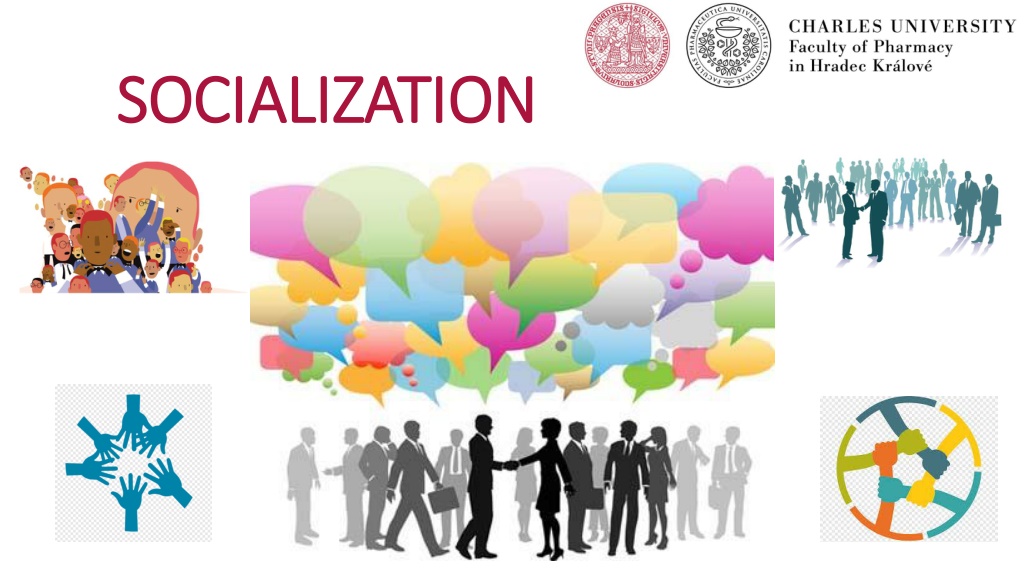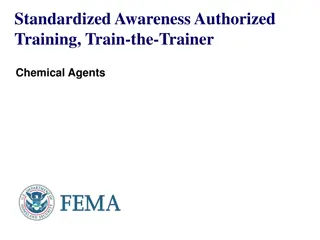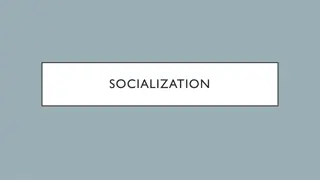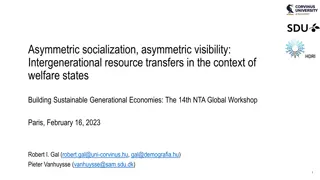Understanding Socialization: Process, Importance, and Agents
Socialization is the process through which individuals adapt to society, internalize its values, and acquire proper behavior. It involves stages like primary and secondary socialization, influenced by theorists like Erikson and Piaget. Agents like family, peers, and institutions play key roles in shaping individuals, highlighting the nature versus nurture debate and the importance of socialization for both individuals and society.
Download Presentation

Please find below an Image/Link to download the presentation.
The content on the website is provided AS IS for your information and personal use only. It may not be sold, licensed, or shared on other websites without obtaining consent from the author. Download presentation by click this link. If you encounter any issues during the download, it is possible that the publisher has removed the file from their server.
E N D
Presentation Transcript
SOCIALIZATION SOCIALIZATION
Definition Definition By socialization we mean: the gradual growth of an individual into society, adaptation to society, acquiring desirable forms of behaviour, adapting to social roles, and internalizing the values and opinions of society. Medical Definition of socialization: the process by which a human being beginning at infancy acquires the habits, beliefs, and accumulated knowledge of society through education and training for adult status
Freud Freud s theory s theory
What are the basic thesis of Erikson, Piaget, What are the basic thesis of Erikson, Piaget, Kohlberg and Gilligan? Kohlberg and Gilligan? Erik Erikson Jean Piaget Lawrence Kohlberg Carol Gilligan
Why Socialization Matters Why Socialization Matters Understand the importance of socialization both for individuals and society Explain the nature versus nurture debate Agents of Socialization Learn the roles of families and peer groups in socialization Understand how we are socialized through formal institutions like schools, workplaces, and the government.
AGENTS OF SOCIALIZATION AGENTS OF SOCIALIZATION Primary Social Group Agents family Secondary Social Groups - Peer Groups Secondary Social Groups - Institutional Agents school, workplace, religion, media Quiz
Stages Stages of of Socialization Socialization Socialization is a process that introduces people to social norms and customs. This process typically occurs in two stages: a) Primary socialization b) Secondary socialization The Purpose of Socialization - a person learns to become a member of a group, community, or society.
Types Types of Socialization of Socialization Sociologists recognize two stages of socialization: primary and secondary. Four types of socialization, primary socialization, anticipatory socialization, professional or developmental socialization and re- socialization.
Social Social Roles Roles; Role ; Role Conflict Conflict
Attitude Attitude Formation Formation Social roles and social norms can havea strong influence on attitudes. Social roles relate to how people are expected to behave in a particular role or context. Social norms involve society's rules for what behaviours are considered appropriate.
Without socialization Without socialization the individual is unable to enter into normal interactions with the other members of the group - the socially disturbed individuals also referred to as ED (emotional disturbance, or social maladjusted) the society is not able to pass on values and standards to the next generation and is falling apart. (downfall of ancient Rome)
Internalization Internalization Socialization can be described as any integration into a new social group, as long as it is connected with internalisation; Internalization - full acceptance of the values and standards that the social system represents.
Internalization Internalizationin in graphs graphs
Introjection and internalization are used Introjection and internalization are used interchangeably interchangeably An example of introjection might be a dad telling his son boys don t cry - this is an idea that a person might take in from their environment and internalize into their way of thinking. The child isn t necessarily identifying with the person who said this (their dad), but they take it in and it becomes part of how they see the world (and consequently, how they believe they should behave). Over time, this might lead to identification with the individual (father) who said it. This would look like the son following in their dad s footsteps and becoming like their dad in more ways than just this belief.
Social adaptation Social adaptation As far as external adaptation is concerned, we are talking about adaptation. Social interaction and communication with other people are a necessary condition for socialization. adaptation
Resocialization Resocialization The disintegration of values and behavioural patterns adopted so far is followed by the adoption of new, radically different ones (e.g. new image). In certain circumstances, even in adults e.g.: psychiatric hospital, prison, barracks, concentration camp.
Conformity I. Conformity I. Compliance with standards and rules of the society - giving life a certain order in society; distinguish us from animals. Conformity Zimbardo prison experiment
Deviant behavior Deviant behavior Behaviour that does not conform with respect to some standard or set of standards accepted by most people in a given society. CLASSIFICATION OF DEVIANT BEHAVIORS: primary deviance - refers to the behaviour that violates a social norm but that does not affect one s sense of self secondary deviance - violation that is a response to the problems caused by the societal reaction to primary deviance.eg community response to the rapist.
Cultural differences Cultural differences Standards and values vary from one culture to another (e.g. view of homosexuality, polygamy, polyandry, etc.); each of us sometimes breaks the norm, followed by sanctions (legislative, social convictions). Cultural diversity: Usually, cultural diversity takes into account language, religion, race, sexual orientation, gender, age and ethnicity.
Thank you for your attention Thank you for your attention























